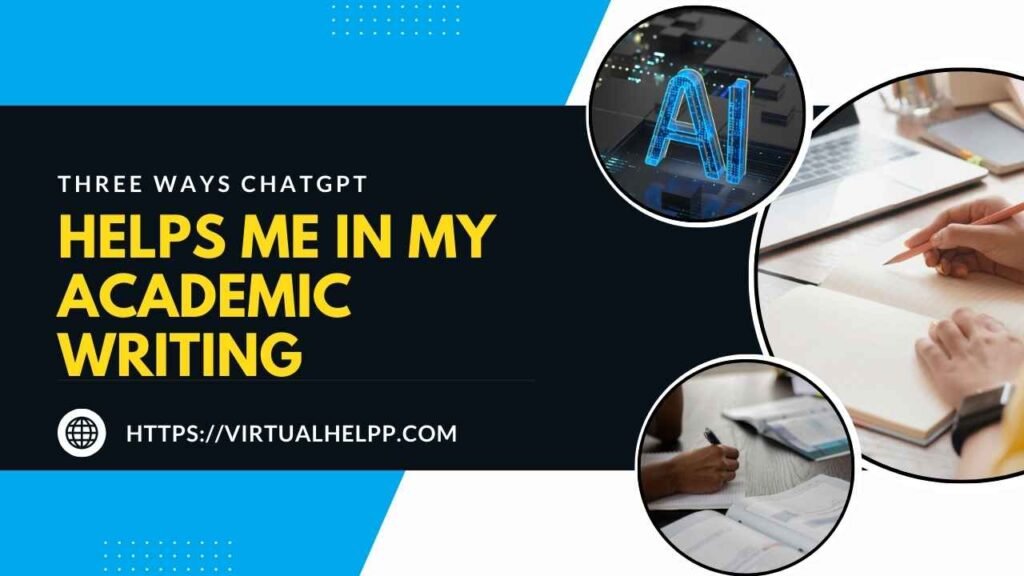In the world of academia, writing can often be a daunting task. Whether it’s crafting the perfect thesis statement, structuring an argument, or ensuring that your paper is free of grammatical errors, the writing process can be overwhelming. Fortunately, technological advancements have made it easier to navigate these challenges. One such advancement is ChatGPT, an AI-powered tool that has become increasingly popular among students for academic writing. In this article, we’ll explore three ways ChatGPT can significantly enhance your academic writing, making the process smoother, more efficient, and ultimately, more successful.

Table of Contents
ToggleUnderstanding ChatGPT
What is ChatGPT?
ChatGPT is an advanced AI language model developed by OpenAI. It leverages deep learning techniques to generate human-like text based on the input it receives. Unlike traditional writing tools that merely check for grammar or spelling errors, ChatGPT can engage in conversations, generate ideas, and even help with structuring entire essays.
Origins and Development of ChatGPT
The development of ChatGPT is rooted in the progress of natural language processing (NLP). It was trained on vast datasets of text from the internet, allowing it to understand and generate text across a wide range of topics. The goal was to create an AI that could mimic human conversation and provide meaningful assistance in various tasks, including academic writing.
How ChatGPT Works in Simple Terms
ChatGPT operates by predicting the next word in a sequence of text, much like how our brains work when forming sentences. It uses context clues from the input it receives to generate relevant and coherent responses. When you input a prompt or question, ChatGPT analyzes the words and structures it, offering suggestions or content that aligns with your needs.
Why Students Are Turning to ChatGPT for Academic Writing
The rise of AI-assisted tools like ChatGPT in academic writing is a reflection of the growing need for efficiency and support in the writing process. Here’s why students are increasingly relying on ChatGPT:
The Growing Trend of AI-Assisted Writing Tools
AI writing tools have evolved from basic grammar checkers to sophisticated systems that can draft entire essays. ChatGPT is at the forefront of this evolution, offering students a powerful resource to enhance their writing without sacrificing quality.
Benefits of Using ChatGPT in Academic Tasks
ChatGPT provides several advantages, including saving time, generating ideas, and improving the overall quality of writing. By using ChatGPT, students can focus on the content and creativity of their work rather than getting bogged down by the technical aspects of writing.
The First Way: Generating Ideas and Outlines
One of the most significant challenges in academic writing is getting started. ChatGPT excels at helping students overcome this initial hurdle by generating ideas and creating structured outlines.
Overcoming Writer’s Block
Writer’s block is a common problem for students, especially when faced with complex topics or tight deadlines. ChatGPT can help you break through this barrier by providing a fresh perspective or a starting point for your writing.
How ChatGPT Can Jumpstart Your Brainstorming Process
When you’re stuck, simply inputting a topic or question into ChatGPT can generate a range of ideas that you might not have considered. This can be incredibly helpful in sparking creativity and getting the writing process moving.
Real-Life Example of Idea Generation
For instance, if you’re struggling to come up with ideas for an essay on climate change, ChatGPT can suggest various angles, such as the impact of climate change on different ecosystems, the role of policy in climate action, or the ethical implications of environmental degradation.
Creating Structured Outlines
Once you have your ideas, the next step is to organize them into a coherent structure. ChatGPT can assist in creating a detailed outline that serves as a roadmap for your essay.
Step-by-Step Guide to Using ChatGPT for Outline Creation
To create an outline, you can ask ChatGPT to break down your topic into main points and subpoints. For example, if your essay is on renewable energy, ChatGPT might suggest sections on types of renewable energy, benefits, challenges, and future prospects.
Benefits of Having a Well-Organized Outline
A well-structured outline helps you maintain focus and ensures that your essay has a logical flow. It also makes the writing process more manageable, as you can tackle each section individually rather than feeling overwhelmed by the entire essay.
The Second Way: Enhancing Clarity and Coherence
Beyond generating ideas and outlines, ChatGPT is also a valuable tool for refining your writing. It can help you enhance the clarity and coherence of your arguments, making your essays more compelling and easier to understand.
Refining Your Thesis and Arguments
Your thesis statement is the backbone of your essay, and your arguments must support it effectively. ChatGPT can help you fine-tune your thesis and ensure that your arguments are well-aligned with it.
How ChatGPT Helps in Clarifying Your Thesis Statement
If you’re struggling to articulate your thesis, ChatGPT can offer suggestions that make it clearer and more concise. For example, if your thesis is too broad, ChatGPT might suggest narrowing it down to a specific aspect of the topic.
Ensuring Logical Flow in Your Arguments
ChatGPT can also help you ensure that your arguments flow logically from one point to the next. By analyzing the structure of your essay, it can identify areas where the logic might be weak or where transitions are needed.
Improving Sentence Structure and Grammar
Clear and correct writing is essential for academic success. ChatGPT can help you polish your writing by improving sentence structure and catching grammatical errors that you might overlook.
How ChatGPT Assists in Polishing Your Writing
By inputting your draft into ChatGPT, you can receive suggestions on how to improve sentence structure, word choice, and overall readability. This can help you elevate your writing from good to great.
Avoiding Common Grammatical Errors with AI Assistance
ChatGPT can help you avoid common mistakes such as subject-verb agreement errors, misplaced modifiers, and awkward phrasing. This ensures that your essay is not only clear but also free of distracting errors.
The Third Way: Expanding Research and Providing Evidence
A well-researched essay is crucial in academia, and ChatGPT can assist in this area by helping you gather information and ensure that your evidence is accurate and properly cited.
Conducting Preliminary Research
Research can be time-consuming, but ChatGPT can help streamline the process by providing relevant information and sources that you can use to support your arguments.
How ChatGPT Helps Gather Relevant Information
By inputting specific queries, you can use ChatGPT to quickly gather information on your topic. While it’s important to verify the information with credible sources, ChatGPT can provide a solid starting point for your research.
Examples of Research-Driven Content Generation
For example, if you’re writing about the effects of social media on mental health, ChatGPT can provide insights into recent studies, statistics, and key arguments that you can further explore in your research.
Fact-Checking and Citation Suggestions
Accuracy is paramount in academic writing, and ChatGPT can assist by helping you fact-check your work and suggesting citation formats.
Ensuring the Accuracy of Information
ChatGPT can help you cross-check facts and figures, reducing the risk of inaccuracies in your essay. However, it’s always important to double-check with primary sources to ensure the reliability of the information.
How ChatGPT Suggests Citation Formats and Sources
ChatGPT can also suggest appropriate citation formats for the information you include in your essay. Whether you’re using APA, MLA, or Chicago style, ChatGPT can guide you in formatting your references correctly.
Potential Pitfalls of Relying on ChatGPT
While ChatGPT is a powerful tool, it’s important to be aware of its limitations and the potential risks of relying too heavily on AI for your academic writing.
Overdependence on AI Tools
Relying too much on ChatGPT can hinder the development of your writing skills. It’s important to use it as a supplement rather than a replacement for your own efforts.
Risks of Not Developing Personal Writing Skills
Overdependence on AI can result in a lack of critical thinking and personal expression in your writing. It’s essential to continue practicing and honing your skills independently.
Balancing AI Assistance with Personal Effort
To strike a balance, use ChatGPT to assist with specific tasks like idea generation or grammar checks, but ensure that the core of your writing remains your own work.
Ethical Considerations
Using AI tools in academic writing raises ethical questions, particularly around plagiarism and originality. It’s crucial to use ChatGPT responsibly.
Understanding Plagiarism Risks
While ChatGPT can generate content, it’s important to ensure that your work is original and properly cited. Plagiarism, even if unintentional, can have serious consequences in academic settings.
How to Use ChatGPT Responsibly
To avoid ethical pitfalls, use ChatGPT as a guide rather than copying text verbatim. Always ensure that your work reflects your own understanding and is properly cited where necessary.
Conclusion
In conclusion, ChatGPT is a versatile tool that can significantly enhance your academic writing. By helping with idea generation, improving clarity and coherence, and assisting with research, ChatGPT can make the writing process more manageable and efficient. However, it’s important to use this tool wisely, balancing its benefits with the need to develop and maintain your own writing skills. By doing so, you can take full advantage of what ChatGPT has to offer while ensuring that your work remains original and ethical.
FAQs
Can ChatGPT completely replace my writing efforts?
No, ChatGPT is a tool meant to assist you, not replace your writing efforts. It’s essential to maintain your voice and input in your work.
How do I ensure my work is still original when using ChatGPT?
To ensure originality, use ChatGPT to generate ideas and refine your writing but always put content in your own words and provide proper citations where necessary.
Is it ethical to use ChatGPT for academic writing?
Yes, it can be ethical as long as you use it responsibly, ensuring that your work is original and that you understand the content you’re submitting.
How can I make sure my professor doesn’t notice I used ChatGPT?
Use ChatGPT as a guide rather than a crutch. Make sure your final submission reflects your own understanding and effort.
What are the limitations of using ChatGPT for academic purposes?
ChatGPT can sometimes generate incorrect or nonspecific content. It’s important to verify all information and use it as a supplement to your own research and writing.





